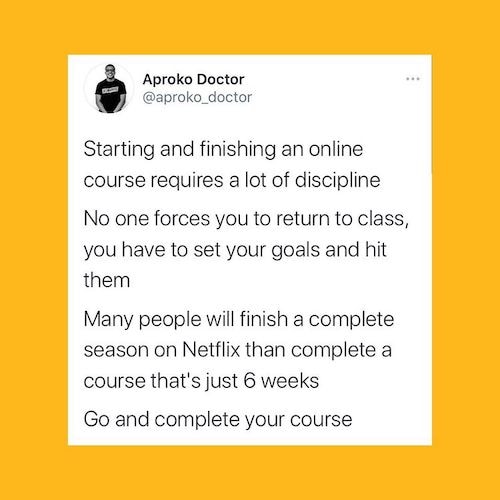Top 5 mistakes to avoid for the new semester

New year, new beginnings. Learning to be an online student was a challenge for many of you last semester. Mistakes were made and lessons were learned. With the winter semester just over the horizon, this is your chance for a fresh start by learning from the past.
To save your future self a lot of headaches and stress, here are 5 of the most fatal mistakes you can make in a new semester learning online:
1. Taking too much advantage of the flexibility
When we asked you “what was most challenging learning online this semester” on our Instagram Stories, most of you answered motivation and self-discipline.
The freedom of online courses is a double-edged sword. On one hand, the flexibility to learn whenever you want and set your own schedule is convenient. On the other, the lack of structure makes it easy for you to slack off.
You can make excuses to get extensions for assignments, makeups for finals, and be late for your lectures. But in your future jobs, these excuses won’t hold up for big presentations or time-sensitive deadlines.
Treat school like a real job.
Think of learning online as a chance to gain some real-world time management and accountability skills. Bad habits can be hard to break.
Go to lectures on time if they’re synchronous. If they’re asynchronous, set your own schedule and make sure you show up for yourself.
If there’s an important due date, write it down in your calendar and manage your time so you can meet it. Some study apps, like Pearson Prep, let you put in your exam dates and send you notifications to remind you to study.
Remember, a full-time job means working for 40 hours. This is how much your instructors expect you to devote to learning. Build a schedule around an 8-hour day and stick to it, even when you don’t feel like it.
Treat school like a real job. Think of learning online as a chance to gain some real-world time management and accountability skills. Bad habits can be hard to break.
The routine may seem difficult at first but the more you can get yourself to do hard things, the easier it will get.
2. Not getting prepared ahead of time for back to school
Many students wait until two weeks of classes looking for course materials. Next thing they know, they’re already behind three weeks’ worth of readings.
Chances are, you already have readings for the first week. Not starting on them ahead of time means you’ll be playing catch up one week in. And we all know how quickly schoolwork piles up.
Take several days before school starts to go through your syllabus and get your course materials.
Thanks to the internet, you don’t even have to get out of your bed to purchase your textbook and do your readings. Sites like the publisher Pearson’s online store let you find any course material you need in just two clicks and even come with free shipping.
Be careful of third-party sites that scam you.
Purchasing directly from publishers and your university bookstore are the most secure, convenient, and can actually save you money given to middlemen.
3. Not taking advantage of your instructor’s recommended study resources and readings
You may think that you only need the required textbooks or to do the required readings to get good grades. And anything extra is a waste of time and money.
But remember: learning in university or college is more than just getting good grades and memorizing information. You won’t do well if you don’t truly understand the materials, adopt good study habits, and use effective tools.
That’s where recommended resources come in. They can be invaluable to your success in the course even if they are not required for grades. How?
Firstly, you learn better when you’re having fun.
Trying to memorize hundreds of scientific terms is not fun, neither is reading through dense pages of information.
While these habits are necessary, only using these study methods to learn will, more often than not, leave you half asleep wondering why any of this information matter.
Recommended readings will help you see how concepts apply to real-life and current events and digest the many facts you’re learning about.
Recommended resources like MyLab and Mastering have fun activities like simulations, videos, and interactive tutorials to help you visualize and fully understand concepts.
Learning in university or college is more than just getting good grades and memorizing information. You won’t do well if you don’t truly understand the materials, adopt good study habits, and use effective tools.
Secondly, they are your 24/7 source of homework help. Your instructors and study group aren’t always available. But your recommended digital tools are.
Most of the popular recommended digital resources come directly from your textbook’s publisher like MyLab, Mastering, and Revel. This means you can access a whole range of study tools built specifically around your textbook and the concepts you need to learn.
For example, you can study with its extra practice questions and pre-made flashcards with questions on your textbook information.
But there’s even tools like personalized study plans that adapt to the textbook chapters you are weaker at and give you immediate feedback.

In university and college, you are in charge of your learning. However much you put in, you will get out of it.
Check your syllabus to see what resources and readings your instructor recommends for you and take advantage of them!
Investing a little bit of time and money into these supplemental resources can make the world of a difference in not only your grades, but more importantly your learning enjoyment.
In university and college, you are in charge of your learning. However much you put in, you will get out of it.
4. Not reflecting on the past semester and your limits
Last semester, many of you found yourselves stretched really thin. Not reassessing your limits can lead you down the same path.
Ask yourself: Are you taking too many courses? Does too much screentime affect your mental health? Does the dark winter weather make you have less energy? Do you have too many extracurricular obligations impeding your academic performance?
It’s okay to reduce your workload in light of your experiences in the fall. Be honest with yourself. Find a school-life balance that works for you and your health.
You should also take the time to think about where you struggled most last year.
Now that you know what to expect with online learning, reflecting on your “low” points can help you make better decisions and stress less this year.
Did you find yourself cramming a lot near the end? If so, maybe you need to time manage your readings better or bring yourself to attend lecture regularly.
Did you study a lot but still didn’t do as well as you hoped? If so, you should re-evaluate your current study habits and learn more effective study strategies or find better study tools.
You don’t have to fix all your mistakes. Just pick 1-2 and focus on improving those areas.
Take the time to think about where you struggled most last year. Not reassessing your limits can lead you down the same path.
5. Not getting help
Just because you’re no longer sitting in a lecture hall with hundreds of other students doesn’t mean that you’re alone.
Aside from all the study tools you have available to you (see #3), your instructors all have office hours. These hours are for you.
Your instructors genuinely want you to come and support you. Even if you don’t have specific questions about course material, you can ask about their research, careers, or simply have a chit-chat. They want to get to know you!
In an online school environment, it may be harder to meet classmates but it’s not impossible. Check your university Facebook groups for any chat groups for your course.
Keep an eye out for students who ask questions in-class you find valuable, or put a lot of thought into their discussion board responses. Reach out to these classmates and you may find yourself with a great study buddy.
Aside from academic help, it’s important that you get mental and emotional support when you need it.
Best of luck in your new 2021 semester!


